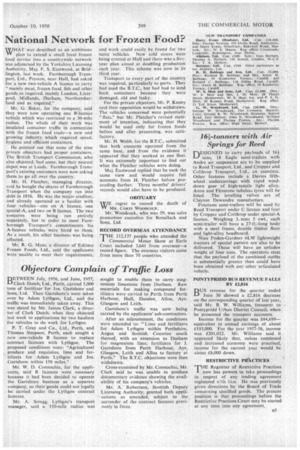National Network for Frozen Food?
Page 39

If you've noticed an error in this article please click here to report it so we can fix it.
WHAT was described as an ambitious plan to extend a small local frozen food Service into a countrywide network
was adjourned by the Yorkshire Licensing Authority, Maj. F. S. Eastwood, at Brid lington, last week. Farnborough Trans port, Ltd., Preston, near Hull, had asked for a new two-vehicle.A licence to carry "mainly meat, frozen food, fish and other" goods as required, mainly London, Liverpool, Midlands, Durham, Northumberland and as required."
Mr. G. Baker, for the company, said they were now operating one B-licence vehicle which was restricted to a 30-mile radius. The whole of their work was insulated container traffic in connection with the frozen food trade—a new and growing industry. which required speed, hygiene and efficient containers, He pointed out that none of the nine private objectors had proper containers.
The British Transport Commission, who also objected, had some, but their nearest depot was at Leeds. Farnborough Transport's existing customers were now asking them to go all over the country.
Mr. H. Fletcher, managing director, said he bought the shares of Farnborough Transport when the company ran into debt in 1956. He was the major creditor, and already operated as a haulier with four vehicles—one on A licence, one special-A, and two on B licence. The two concerns were being run entirely separately, but in order to meet Farnborough Transport's commitments his A-licence vehicles were hired to them. As a result, his other business was being affected.
Mr. R. G. Moss, a director of Eskimo Frozen Foods, Ltd., said the applicants were unable to meet their requirements, and work could easily be found for 'two more vehicles. New cold stores were being erected at Hull and there was a fiveyear plan aimed at doubling production each year. This scheme was now in its third year.
Transport to every part of the country was required, particularly to ports. They had used the B.T.C., but had had to send back containers because they were damaged, old and leaky.
For the private objectors, Mr. P. Kenny said their opposition would be withdrawn. The vehicles concerned were potentially "fiats," but Mr. Fletclaer's revised statement of intention, indicating that they would be used only for frozen foods before and after processing, was satisfactory.
Mr. H. Webb, for the B.T.C., submitted that both concerns operated from the same base, and from the evidence it appeared that they worked as one fleet. It was extremely important to find out what the Fletcher vehicles were doing.
Maj. Eastwood replied that he took the same view and would require full accounts from H. Fletcher before proceeding further. Three months' drivers' records would also have to be produced.
OBITUARY VIRE regret to record the death of rlf MIL CORTI WOODCOCK.
Mr. Woodcock, who was 59, was sales promotion executive for Bonallack and Sons, Ltd.
RECORD OVERSEAS ATTENDANCE
"FITE 112,137 people who attended the 1 Commercial Motor Show at Earls Court included 3,641 from overseas—a record figure. The overseas visitors came from more than 70 countries.




































































































